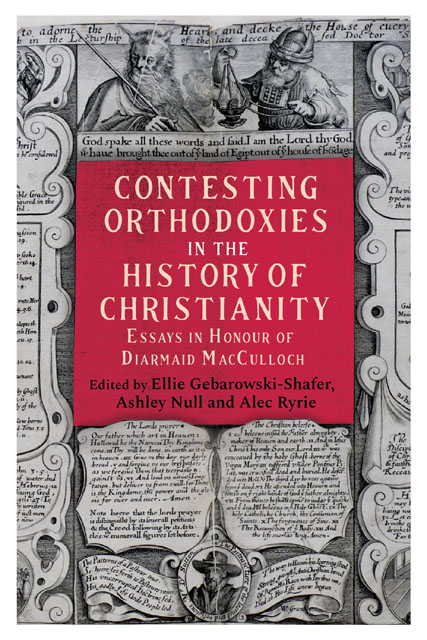Book contents
- Frontmatter
- Contents
- List of Illustrations
- List of Contributors
- List of Abbreviations
- Introduction
- 1 ‘Jewish Christianity’ in Antiquity: Meaningless Category or Heuristic Irritant?
- 2 ‘Sola Fide’: the Wrong Slogan?
- 3 Both Cromwellian and Augustinian: the Influence of Thomas Cromwell on Reform within the Early Modern English Austin Friars
- 4 Lex, Rex and Sex: The Bigamy of Philipp of Hesse and the Lutheran Recourse to Natural Law
- 5 The Authority of Scripture in Reformation Anglicanism: Then and Now
- 6 Orthodoxy and Heresy in the Post-Reformation
- 7 Profanity and Piety in the Church Porch: the Place of Transgression in Early Modern England
- 8 Writing on the Walls: Word and Image in the Post-Reformation English Church
- 9 The Myth of the Church of England
- 10 Mysticism, Orthodoxy and Reformed Identity before the English Revolution: the Case of John Everard
- 11 Sacrilege and the Sacred in England’s Second Reformation, 1640–1660
- 12 ‘I had not the patience to be quiet’: Arthur Bury and The Naked Gospel
- 13 ‘A soul-corrupting indifferentism’: the Intellectual Development of Benjamin Henry Latrobe
- 14 Newman, Dogma and Freedom in the Church
- 15 ‘Tommy, ’ow’s yer soul?’ Reconsidering Religion and the British Soldier
- 16 The King James Vulgate
- 17 The Myth of the Anglican Communion?
- Select bibliography of Diarmaid MacCulloch’s scholarly publications
- Bibliography
- Index
- Tabula Gratulatoria
- Studies in Modern British Religious History
Introduction
Published online by Cambridge University Press: 09 January 2024
- Frontmatter
- Contents
- List of Illustrations
- List of Contributors
- List of Abbreviations
- Introduction
- 1 ‘Jewish Christianity’ in Antiquity: Meaningless Category or Heuristic Irritant?
- 2 ‘Sola Fide’: the Wrong Slogan?
- 3 Both Cromwellian and Augustinian: the Influence of Thomas Cromwell on Reform within the Early Modern English Austin Friars
- 4 Lex, Rex and Sex: The Bigamy of Philipp of Hesse and the Lutheran Recourse to Natural Law
- 5 The Authority of Scripture in Reformation Anglicanism: Then and Now
- 6 Orthodoxy and Heresy in the Post-Reformation
- 7 Profanity and Piety in the Church Porch: the Place of Transgression in Early Modern England
- 8 Writing on the Walls: Word and Image in the Post-Reformation English Church
- 9 The Myth of the Church of England
- 10 Mysticism, Orthodoxy and Reformed Identity before the English Revolution: the Case of John Everard
- 11 Sacrilege and the Sacred in England’s Second Reformation, 1640–1660
- 12 ‘I had not the patience to be quiet’: Arthur Bury and The Naked Gospel
- 13 ‘A soul-corrupting indifferentism’: the Intellectual Development of Benjamin Henry Latrobe
- 14 Newman, Dogma and Freedom in the Church
- 15 ‘Tommy, ’ow’s yer soul?’ Reconsidering Religion and the British Soldier
- 16 The King James Vulgate
- 17 The Myth of the Anglican Communion?
- Select bibliography of Diarmaid MacCulloch’s scholarly publications
- Bibliography
- Index
- Tabula Gratulatoria
- Studies in Modern British Religious History
Summary
Christianity is, as Diarmaid MacCulloch has observed, not so much a ‘religion’ in the conventional sense as a personality cult: an extraordinarily diverse and quarrelsome family of faiths which agree on almost nothing except putting the figure of Jesus of Nazareth at their centre. But there are a handful of other features very widely shared across that family, one of which, ironically enough, is the concept of orthodoxy: literally, ‘right opinion’. As historians, it is not our role to assess which doctrinal truth-claims are right; nor can we responsibly assume that they are all wrong. We can, however, observe that Christians see the matter as profoundly important. They may never have been able to agree on the doctrinal expression of their beliefs, but they have generally agreed that they ought in principle to be able to do so. The notion that there is a ‘catholic’, or universal, Christian faith – that which, according to the famous fifth-century formula, has been believed everywhere, at all times, and by all people – is itself an act of faith: to reconcile it with the historical fact of persistent division and plurality requires a ruthless willingness to exclude some self-professed Christians, or an indulgent readiness to include others, or (more commonly) some combination of the two. And yet, if Christian orthodoxy and the one holy, catholic and apostolic church which is its custodian are more visible to the eye of faith than to the historian, historians cannot avoid the persistent power of the ideal of orthodoxy, which Christians have never (yet) attained but for which they have always strived. This volume is about the pursuit of that ideal and its consequences for the history of Christianity.
This gap between a universally recognised Christianity throughout all ages and places and the myriad competing conventions of its widely diffuse local embodiments is so persistent that it seems to be not an aberration but part of the very nature of Christian faith itself. The missiologist Andrew Walls has argued that the Incarnation was a ‘divine act of translation’. The Word becoming flesh accepted one local human culture as suitable for the particularisation of universal truth. Ever since, each Christian community has believed that in Scripture ‘God is speaking to its own situation’.
- Type
- Chapter
- Information
- Contesting Orthodoxies in the History of ChristianityEssays in Honour of Diarmaid MacCulloch, pp. 1 - 6Publisher: Boydell & BrewerPrint publication year: 2021



